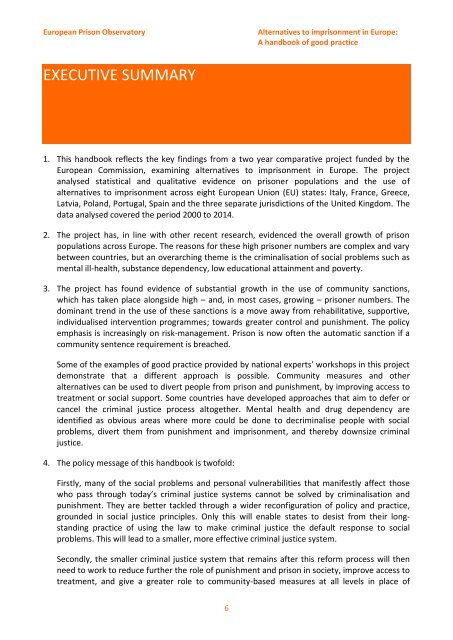good practice
Alternatives%20to%20imprisonment%20in%20Europe
Alternatives%20to%20imprisonment%20in%20Europe
You also want an ePaper? Increase the reach of your titles
YUMPU automatically turns print PDFs into web optimized ePapers that Google loves.
European Prison Observatory<br />
Alternatives to imprisonment in Europe:<br />
A handbook of <strong>good</strong> <strong>practice</strong><br />
EXECUTIVE SUMMARY<br />
1. This handbook reflects the key findings from a two year comparative project funded by the<br />
European Commission, examining alternatives to imprisonment in Europe. The project<br />
analysed statistical and qualitative evidence on prisoner populations and the use of<br />
alternatives to imprisonment across eight European Union (EU) states: Italy, France, Greece,<br />
Latvia, Poland, Portugal, Spain and the three separate jurisdictions of the United Kingdom. The<br />
data analysed covered the period 2000 to 2014.<br />
2. The project has, in line with other recent research, evidenced the overall growth of prison<br />
populations across Europe. The reasons for these high prisoner numbers are complex and vary<br />
between countries, but an overarching theme is the criminalisation of social problems such as<br />
mental ill-health, substance dependency, low educational attainment and poverty.<br />
3. The project has found evidence of substantial growth in the use of community sanctions,<br />
which has taken place alongside high – and, in most cases, growing – prisoner numbers. The<br />
dominant trend in the use of these sanctions is a move away from rehabilitative, supportive,<br />
individualised intervention programmes; towards greater control and punishment. The policy<br />
emphasis is increasingly on risk-management. Prison is now often the automatic sanction if a<br />
community sentence requirement is breached.<br />
Some of the examples of <strong>good</strong> <strong>practice</strong> provided by national experts’ workshops in this project<br />
demonstrate that a different approach is possible. Community measures and other<br />
alternatives can be used to divert people from prison and punishment, by improving access to<br />
treatment or social support. Some countries have developed approaches that aim to defer or<br />
cancel the criminal justice process altogether. Mental health and drug dependency are<br />
identified as obvious areas where more could be done to decriminalise people with social<br />
problems, divert them from punishment and imprisonment, and thereby downsize criminal<br />
justice.<br />
4. The policy message of this handbook is twofold:<br />
Firstly, many of the social problems and personal vulnerabilities that manifestly affect those<br />
who pass through today’s criminal justice systems cannot be solved by criminalisation and<br />
punishment. They are better tackled through a wider reconfiguration of policy and <strong>practice</strong>,<br />
grounded in social justice principles. Only this will enable states to desist from their longstanding<br />
<strong>practice</strong> of using the law to make criminal justice the default response to social<br />
problems. This will lead to a smaller, more effective criminal justice system.<br />
Secondly, the smaller criminal justice system that remains after this reform process will then<br />
need to work to reduce further the role of punishment and prison in society, improve access to<br />
treatment, and give a greater role to community-based measures at all levels in place of<br />
6





